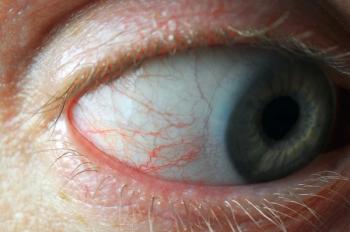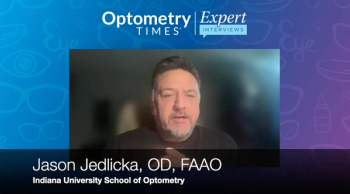
AAOpt 2024: What to know about this year's diabetes update
Jeffry Gerson, OD, FAAO, gave a presentation on what to know about diabetes diagnostic tools and treatment alongside Paul Chous, OD, FAAO.
Alongside Paul Chous, OD, FAAO, Jeffry Gerson, OD, FAAO, picked over literature published in the last 12 to 18 months to provide an update on new developments in diabetes eye care for this year's American Academy of Optometry (AAO) meeting in Indianapolis, Indiana.
Video transcript:
Editor's note: The below transcript has been lightly edited for clarity.
Jordana Joy:
Hi everyone. I'm here today with Dr Jeffry Gerson of Grin Eye Care in Kansas. He's here to chat about his presentation, "Diabetes Update: What's New in 2024," that he gave at this year's AAO meeting in Indianapolis, Indiana. So welcome. It's a pleasure to have you here today.
Jeffry Gerson, OD, FAAO:
No, thank you very much for having me. Excited to tell you about the talk.
Joy:
Of course, we're excited too. So first, would you be able to give an overview of your presentation?
Gerson:
Yeah, you know, I think the way I would start an overview is that this is a talk that I was able to do with my really good friend and colleague, Dr Paul Chous, and he and I have been doing basically the same title talk for more than 15 years now for the Academy of Optometry, which makes it sound like we keep doing the same thing, but the name of the talk is "Diabetes Update," and it's completely new every year. So really what we do every year is we look at published literature over the last 12 to 18 months and pick out little gems that we think are important, both in the world of diabetes and in diabetes eye care. So that's the gist of what we talk about.
Joy:
Awesome. So what were some of those gems this year?
Gerson:
Yeah, so this year, we chose to talk a little bit about the GLP-1 drugs and how they work systemically, and whether we do or don't need to worry about them when it comes to our patients' eyes. You know, actually not from literature, but talked a little bit about the direct to consumer campaigns that we see some of the drug companies currently doing that are focused on both diabetes and macular degeneration. And then just talked about some of the other new both eye treatments and systemic treatments and things we've learned over the last 12 months.
Joy:
Yeah, absolutely. So how does that new information in any type of way change diabetes management on the OD side of care.
Gerson:
That's a really good question, because we want to always make our talks practical, and the way we look at it is, over the course of the hour talk, we probably talk about 20 to 25 different topics, each one pretty briefly, and so our hope is that 1 or 2 of the things we talk about will be something that people will integrate into their daily practice and how they're talking with patients, and maybe another 1 or 2 will just change the way they think about diabetes care. So we know that not everything we talk about will be practical and relevant to everybody, but we're pretty convinced that at least a few of the things that we talked about will be, that everyone will take away something that they can integrate in their practices the next day in clinic.
Joy:
Absolutely, yeah. So in that, what improvements do you think, for just common eye exams that can potentially make early detection possible, is there any information that had come out this year or anything that you see coming out next year that can help in that early detection?
Gerson:
Yeah so one of the things that we talked about in our talk was early screening for diabetic retinopathy outside of eye care providers' offices, so primary care or endocrinology. The FDA approved a handheld fundus camera that uses cloud-based artificial intelligence to be able to detect more than mild, nonproliferative diabetic retinopathy. So I think this is important because it helps to prioritize referrals to eye care providers. We know and primary care providers know that anybody with diabetes needs an eye exam, but if they're able to screen and detect people that have some significant retinopathy, then that kind of changes the urgency. So that's something that we see changing in helping to get the right people to the right places sooner. And we think that's also a motivator for patients with especially when they know they already have active disease.
Joy:
Absolutely, yeah. So do you find that there are any treatment options that may be overlooked, either something that's new, or has been proven over a long period of time to be effective?
Gerson:
You know, another one of the things that we talked about is there's an oral medication called Tricor that in other parts of the world has been being used as a treatment for people with diabetic retinopathy to help reduce progression. And the reason we talked about is because it's not being used in the US yet, but there is an ongoing clinical trial that we would encourage people to consider sending patients in for because it's an oral treatment for anyone with NPDR, to try to see if it helps prevent it from progressing. And so I think that's something that could dramatically change the landscape from a number of perspectives, and one of them is that it's an oral medication that's already existing, that we as optometrists could potentially be prescribing to patients, if it becomes more standard of care here in the United States.
Joy:
Absolutely, yeah. Was there anything else that you wanted to add that we haven't touched on yet?
Gerson:
I think the overarching or general thought that Paul and I really like to get across is that, as optometrists, there's a huge role that we can play in the care for our patients with diabetes, and that we don't need to and probably shouldn't just limit it to how do your eyes look today. And so that's why we think it's important to talk about all these things and a lot of more foundational diabetes information, because ultimately, that's what determines how well your patients will do. And so it's just something that we're really excited to talk about every year. Every year, it's not necessarily tricky, but it's a lot of work to put together and really pick out our favorites from the year. So it's a really fun talk for us to get to.
Newsletter
Want more insights like this? Subscribe to Optometry Times and get clinical pearls and practice tips delivered straight to your inbox.















































